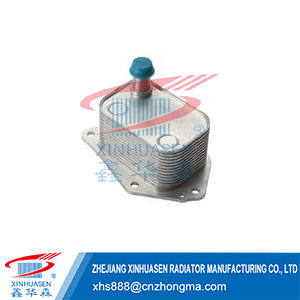Key Components of Oil Coolers
2024-06-15
An oil cooler is a device used to cool the oil in mechanical systems, particularly in engines and transmissions. By reducing the oil temperature, it helps maintain optimal performance, extends the life of the oil and the components it lubricates, and prevents overheating. Oil coolers are essential in high-performance, heavy-duty, and high-temperature environments. Here's an overview of oil coolers, their types, components, and benefits:
Key Components
1. Core:
- Fins and Tubes: The core typically consists of a network of fins and tubes, through which the oil flows. The fins increase the surface area for better heat dissipation.
- Plate and Fin Design: Alternating layers of thin plates and fins to maximize the cooling surface area.
2. Inlet and Outlet Ports:
- Connections: Ports for oil to enter and exit the cooler. These are usually threaded or have specific fittings for secure attachment to oil lines.
3. Mounting Brackets:
- Attachment Points: Brackets or tabs for mounting the oil cooler securely in place, often near the airflow path, like behind the radiator or in front of the vehicle.
4. Thermostatic Bypass Valve (optional):
- Temperature Control: Ensures oil bypasses the cooler until it reaches a certain temperature, preventing overcooling.
Types of Oil Coolers
1. Air-Cooled Oil Coolers:
- Cooling Mechanism: Uses ambient air to dissipate heat from the oil. Mounted in areas with good airflow.
- Applications: Common in automotive, motorcycle, and aircraft engines.
2. Water-Cooled Oil Coolers:
- Cooling Mechanism: Uses coolant (water/antifreeze mix) to transfer heat from the oil. The coolant then dissipates the heat in the radiator.
- Applications: Often used in marine engines and high-performance automotive applications.
3. Transmission Oil Coolers:
- Specialized Use: Specifically designed to cool transmission fluid, often integrated into the vehicle's radiator or as a separate unit.
- Applications: Heavy-duty trucks, performance vehicles, and towing applications.
4. Engine Oil Coolers:
- Dedicated Cooling: Focuses on cooling the engine oil, typically used in high-performance or heavy-duty engines.
- Applications: Racing cars, trucks, and motorcycles.
Benefits
1. Enhanced Performance:
- Temperature Regulation: Keeps oil within optimal temperature ranges, ensuring it maintains its lubricating properties and reduces wear and tear on the engine.
2. Extended Oil Life:
- Reduced Oxidation: Lower temperatures slow down oil degradation, extending the time between oil changes.
3. Preventing Overheating:
- Heat Dissipation: Helps prevent the engine or transmission from overheating, particularly under heavy loads or high-performance conditions.
4. Improved Engine Longevity:
- Component Protection: By maintaining proper oil temperatures, oil coolers help protect critical engine components from thermal stress and wear.
Installation and Maintenance
1. Placement:
- Airflow Consideration: For air-cooled oil coolers, ensure placement in an area with good airflow, such as behind the front grille.
- Integration: Water-cooled systems need proper integration with the existing coolant system.
2. Connections:
- Secure Fittings: Ensure all oil lines and fittings are securely connected to prevent leaks.
- Thermostatic Valve: If using a thermostatic valve, ensure it is correctly installed and functioning.
3. Maintenance:
- Regular Inspection: Check for leaks, blockages, and proper operation of the cooling fins and connections.
- Cleaning: Keep the cooler clean from debris and dirt to maintain efficient cooling performance.
Popular Brands and Models
1. Mishimoto:
- Products: High-quality automotive oil coolers known for their durability and performance.
- Applications: Wide range for different vehicle types and performance levels.
2. Derale:
- Products: Offers both engine and transmission oil coolers with various configurations and sizes.
- Applications: Suitable for automotive, racing, and towing applications.
3. Setrab:
- Products: Premium oil coolers, often used in high-performance and racing environments.
- Applications: Focus on reliability and efficiency in demanding conditions.
4. Hayden Automotive:
- Products: Reliable and affordable oil coolers for a range of automotive applications.
- Applications: Everyday vehicles, trucks, and performance cars.
Conclusion
Oil coolers are essential components in maintaining the optimal performance and longevity of engines and transmissions by preventing overheating and ensuring proper lubrication. With various types designed for specific applications, selecting the right oil cooler involves considering factors like the operating environment, cooling requirements, and compatibility with the vehicle or system. Regular maintenance and proper installation are key to ensuring their effectiveness and durability.



